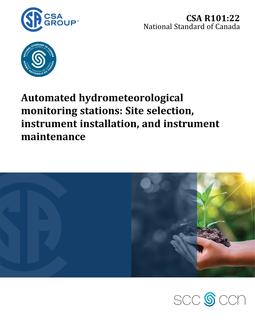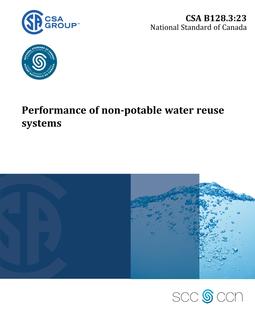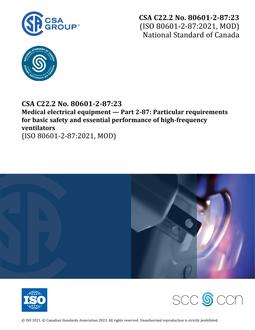
CSA R101:22
Preface
This is the first edition of CSA R101, Automated hydrometeorological monitoring stations: Site selection, instrument installation, and instrument maintenance. CSA Group has been commissioned to develop four national Standards in support of hydrometeorological monitoring programs with automated, surface-based, in-situ stations. The Standards cover the following areas: a) dissemination of metadata for automated hydrometeorological monitoring stations; b) automated hydrometeorological monitoring stations: site selection, instrument installation, and instrument maintenance; c) a data quality rating system; and d) dissemination of hydrometeorological data. These Standards promote the standardization of methods, procedures, techniques, and practices used for collecting hydrometeorological data and related information across Canada. They are meant to be inclusive of large as well as small installations in order to encapsulate a maximum number of automated observing sites describing atmospheric and hydrologic variables. Standardization and improved best practices will help make more hydrometeorological observations become more easily accessible to a larger and better-informed audience. CSA Group acknowledges that the development of this Standard was made possible, in part, by the financial support of the Standards Council of Canada. This Standard was prepared by the Subcommittee on Siting, Design, Operations, and Maintenance of Canadian Weather Stations, under the jurisdiction of the Technical Committee on Weather Stations and the Strategic Steering Committee on Environment and Business Excellence, and has been formally approved by the Technical Committee. This Standard has been developed in compliance with Standards Council of Canada requirements for National Standards of Canada. It has been published as a National Standard of Canada by CSA Group.
Scope
1.1 Object This Standard provides Canadian monitoring network operator requirements and recommendations for selecting sites for automated, surface-based, hydrometeorological monitoring stations, and broad guidance for installing and maintaining commonly used automated hydrometeorological instrumentation. This Standard has two main technical sections: a) Clause 4, on station infrastructure, discusses general layouts of instrumentation and desirable characteristics of hydrometeorological stations. b) Clause 5, on site selection and sensor installation and maintenance, presents criteria for selecting and classifying monitoring sites for specific and commonly used sensors. It also provides detailed information on the installation and maintenance best practices for various sensors. Note: This Standard is complementary to industry-specific requirements, such as for surface-based stations in support of aviation, avalanche forecasting, road safety, etc. Guidelines on variable units and precision, sampling schedules, sample aggregation periods, field verification intervals, and sensor recalibration intervals are provided in CSA R102.
1.2 Exclusions This Standard does not address surface water, groundwater, and detailed snow, glacier mass balance, and air quality (pollutant) monitoring equipment. Further, this Standard excludes less commonly used instrumentation such as L, S, C, X, and K band acoustic Doppler weather RADAR, mini-weather RADAR, SODAR wind profilers, and ceilometers, as well as manually operated instrumentation.
1.3 Terminology In this Standard, “shall” is used to express a requirement, i.e., a provision that the user is obliged to satisfy in order to comply with the Standard; “should” is used to express a recommendation or that which is advised but not required; and “may” is used to express an option or that which is permissible within the limits of the Standard. Notes accompanying clauses do not include requirements or alternative requirements; the purpose of a note accompanying a clause is to separate from the text explanatory or informative material. Notes to tables and figures are considered part of the table or figure and may be written as requirements. Annexes are designated normative (mandatory) or informative (non-mandatory) to define their application.
Product Details
- Edition:
- 1st
- Published:
- 06/30/2022
- ISBN(s):
- 9781488336836
- Number of Pages:
- 104
- File Size:
- 1 file , 19 MB
- Product Code(s):
- 2429232, 2429234, 2429234, 2429232
- Note:
- This product is unavailable in Russia, Ukraine, Belarus


